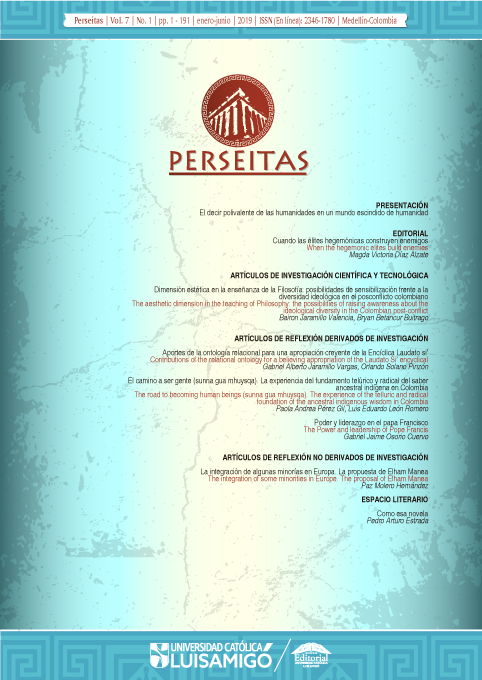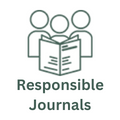The Power and leadership of Pope Francis
DOI:
https://doi.org/10.21501/23461780.3156Keywords:
Pope Francisco, Power, Leadership, Political TheologyAbstract
The hyper globalization brings in so many benefits but also a deep crisis, people need the best guidance to survive in business, the market, politics, etc., and of course in their everyday life. He emphasizes, although religious, his messages and gestures to captivate and reflect his dialogue with the world, overflowing his role in the church where he has overcome powerful resistance, for millions of people he is the great guide. How has he done it? Many publications have addressed it only in the aspect of leadership. This argumentative descriptive analysis responds in a novelistic way why it relates power and leadership to Francisco. To study it from this perspective to one of the most influential figures in the global content, it proposes an interdisciplinary and theoretical framework applied in three synchronic moments. The first two identify the characteristics, starting with the theory of the path and objective and the political theology; the second, from the realistic theory of power, differentiating political leadership, the art of government and the vision of Laudato Sí; the third, investigates the fundamentals, with a contextual intelligence and a heroic spirituality. As a result, the actuality of a leadership is identified, as well as providing tools to analyze or guide processes of organizational, social, pastoral and political transformation.Downloads
References
Aciprensa. (19 de septiembre 2015). La clave para ser un buen líder según el Papa. Recuperado de www.aciprensa.com/noticias/la-clave-para-ser-un-buen-lider-segun-el-papa-francisco-67292
Bachrach, P., & Baratz, M. (1963). Decisions and Nondecisions: An Analytical Framework. American Political Science Review, 57(3), 632-642.
Bachrach, P., & Baratz, M. (1962). Two Faces of Power. American Political Science Review, 56(4), 947-952. doi:10.2307/1952796
Breton, D. L. (2007). Antropologia del dolore. Trad. René Capovin. Roma: Meltemi
Byron, W. & Connor, J. L. (2016). Principles of Ignatian leadership: a resource for a faith-committed life. New York, Mahwah: Paulist Press.
Casanova, J. (2013). Exploring the postsecular. Three meanings of the secular and ther possible transcendence. En Calhoun, C., Mendieta, E. & J. Van. (Eds), Habermas and religion. Malden, MA: Polity press.
Dahl, R. A. (1957). The Concept of Power. Behavioral Science, 2(3/July), 201-215.
D'Ambrosio, R. (2016). Lo conseguirá Francisco?: el reto de la reforma eclesial. Madrid: San Pablo.
Espadaro. A. SJ. (19 de agosto 2013). Entrevista Papa Francesco. Recuperado de //w2.vatican.va/content/francesco/es/speeches/2013/september/documents/papa-francesco_20130921_intervista-spadaro.html
Francisco. (1 de enero 2019). Mensaje para la LII Jornada Mundial de la Paz: La buena política está al servicio de la paz. Recuperado de //press.vatican.va/content/salastampa/es/bollettino/pubblico/2018/12/1.html
Francisco. (2015). Carta Encíclica Laudato Sí. Sobre El Cuidado de la casa común. Roma: Libreria Editrice Vaticana.
Francisco. (22 de diciembre 2014). Discurso de Saludo Navideño a la Curia Romana. Recuperado de //w2.vatican.va/content/francesco/es/speeches/2014/december/docum.html
Francisco. (2013). Exhortación Apostólica Evangelii Gaudium. Roma: Libreria Editrice Vaticana.
Fancisco. (2013a). Non fatevi rubare la speranza. La prehiera, peccato, la filosofía e la política pensati alla luce della speranza. Milano: Arnoldo Mondatori.
Giddens, A. (2011). Consecuencias de la modernidad. Madrid: Alianza.
Horowitz, J. (1 de mayo 2018). Todos contra Francisco, pero el Papa sigue intentando cambiar la Iglesia. The new york times. Recuperado de www.nytimes.com/es/2018/05/01/papa-francisco-criticas-logros/?rref=collection%2Fsectioncollection%2Fnyt-es
House, R.J. and Mitchell T.R. (1975). Path-Goal Theory of Leaderhsip. University of Washington Seattle. Technical Report. 75-67. Recuperado de www.dtic.mil/dtic/tr/fulltext/u2/a009513.pdf
Isaac, J. (1987a). Beyond the Three Faces of Power: A Realist Critique. Polity, 20(1), 4-31
Isaac, J. (1987b). Power and Marxist Theory: A Realist View. New York: Cornell University.
Ivereigh, A. (2015). El gran reformador: Francisco, retrato de un Papa radical. Barcelona: Ediciones B, S.A
Lowney, C. (2015). Papa Francisco: Lecciones de liderazgo. Buenos Aires: Granica.
Lowney, C. (2005). Leader per vocazione. I principi della leadership secondo i Gesuiti. Trad. Gian luigi Giacone. Milano: il Sole 24 Ore.
Lowney, C. (2004). El liderazgo al estilo de los Jesuitas: las mejores prácticas de una Compañía de 450 años que cambió el mundo. Bogotá: Norma.
Lukes, S. (2007). El Poder: Un Enfoque Radical. Madrid: Siglo XXI.
Northouse, P. G. (2015). Leadership: Theory and Practice. 7th Ed. Western Michigan University: Sage publications, Inc.
Nye, J. S. (2009). Leadership e potere: hard, soft, smart power. Trad. A. Oliveri Roma: Laterza.
Rosito, V. (2015). La teologia politica contemporanea. Paradigmi, autori, prospettive. Roma: Studium.
Rosito, V. (2013). La partecipazione salvata: teologia politica e immagini della crisi. Assisi: Cittadella.
Stamati, F. (2017). Tra personalitá e ‘arte di governo’. Una proposta analitica sulla nozione di leadership politica. Quaderni di Scenza Politica, Anno XXIV(2), 289-315.
Ulrich, B. (1998). La sociedad del riesgo. Hacia una nueva modernidad. Barcelona: Paidós.
Weber, M. (1922/1968). Economia e Societá. Sociologia del potere. Vol. II. 2ed. Trad. Pietro Rossi. Milano: Edizioni di Comunitá
Downloads
Published
How to Cite
Issue
Section
License
Copyright (c) 2019 Perseitas

This work is licensed under a Creative Commons Attribution-NonCommercial-NoDerivatives 4.0 International License.
La revista y los textos individuales que en esta se divulgan están protegidos por las leyes de copyright y por los términos y condiciones de la Licencia Creative Commons Atribución-No Comercial-Sin Derivar 4.0 Internacional.
















